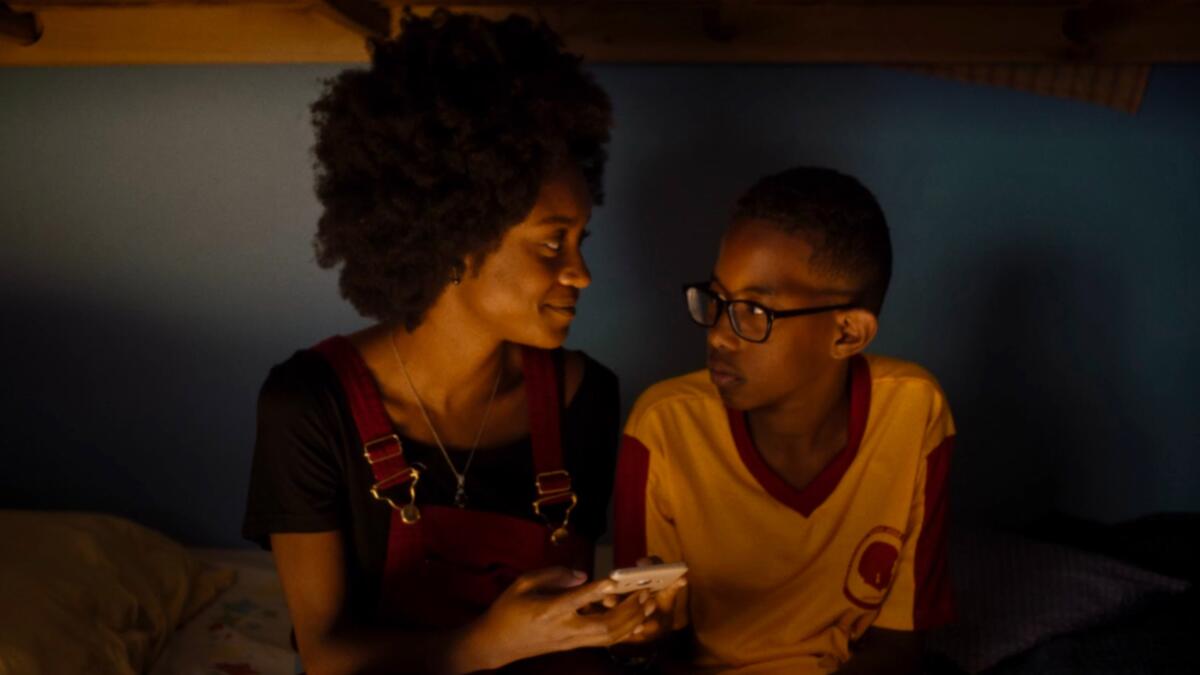Review: Brazilian family drama ‘Mars One’ offers hope amid political turmoil

- Share via
When you need to feel good about the future — whether that requires looking out or up, toward the person you’re with or inside yourself — the Brazilian family drama “Mars One” has a character for you to sympathize with and root for, as if they were your own flesh and blood.
Writer-director Gabriel Martins’ second feature is a big pumping heart of a movie, with its foursome of Black working-class strivers exhibiting an attitude toward making their own and one another’s dreams come true that’s in pointed contrast to what divisive, far-right extremist Jair Bolsonaro’s election victory portended in 2018. That political news sets the time frame in the opening moments, almost like a dare Martins gave himself to convincingly tell an uplifting story about people for whom struggle is built into each day and politics are rarely the answer.
For your safety
The Times is committed to reviewing theatrical film releases during the COVID-19 pandemic. Because moviegoing carries risks during this time, we remind readers to follow health and safety guidelines as outlined by the CDC and local health officials.
In the painterly warmth of his effort, he succeeds, without condescension or pathos, but also without ignoring daily life’s realities or the psychologies of tight-knit families in strapped circumstances. The sound of the Bolsonaro election being called, for instance, comes as we watch a boy named Deivinho (Cícero Lucas) gazing at the night sky, his sereneness cluing us in that optimism and promise will be this movie’s thrusters, not despair.
Smart, quiet Deivinho smiles unconsciously at a volcano demonstration in class and wants to be an astrophysicist, specifically to be part of a program that will one day colonize Mars. The only goals his sports-obsessed dad Wellington (Carlos Francisco) can see, however, are the kind his son makes on the soccer field. A four-years-sober caretaker at a condo high-rise, Wellington is convinced Deivinho playing for the big-league Cruzeiro club is only a tryout away. (This proud father even gets encouragement in that quest from one of his workplace’s notable residents: Argentine ex-footballer Juan Pablo Sorín in a touchingly spirited cameo.)
Similarly concerned about letting down their folks is Deivinho’s thoughtful, observant older sister, Eunice (Camilla Damião), who wants to move out and into an apartment with her new girlfriend, Joana (Ana Hilário). Leaving home is enough of a blow to the united household even without worrying about how her sexuality will be accepted. But mother Tercia (an expressive Rejane Faria), who works as a cleaner, is in her own state of apprehension, almost a sort of reverse hope — after her nerves are rattled by a cruel reality TV prank involving a fake terrorist explosion, she’s come to believe she might be a curse to her loved ones.
In its narrative simplicity, “Mars One” can resemble at times a sturdily blueprinted episode of heart-tugging family television — save a moment of joyful eroticism between Eunice and Joana, and a plot contrivance for Deivinho you’ll see coming a mile away. But as wrapped in the adoring attention of Martins’ direction, which foregrounds the strikingly textured, portrait-style cinematography of Leonardo Feliciano — who respects the demonstrative luminosity of light on individual skin tones in a way few DPs do these days — it plays as soulful, not schematic.
In other words, don’t expect a slice of naturalistic grit here, or the stuff that builds to a climactic cry of why-us anguish. Martins is more interested in the emotional currents when ordinary, caring people allow themselves to hope. He’d rather revel in the quiet humanity of siblings who see each other, or the air of steady faith in an AA meeting, or an act of kindness, than wallow in the low points of already-close-to-the-ground lives.
Some not great things happen in “Mars One.” And there is agony. But there are also the good things done in response that keep families like these soldiering on. It’s why Martins is fond of framing his characters against the horizon, like figures of inherent height and strength, as worthy of attention as the mysterious planet a kid marvels at through a telescope.
'Mars One'
In Portuguese with English subtitles
Rated: TV-MA, for language, nudity, smoking
Running time: 1 hour, 55 minutes
Playing: Available Jan. 5 on Netflix
More to Read
Only good movies
Get the Indie Focus newsletter, Mark Olsen's weekly guide to the world of cinema.
You may occasionally receive promotional content from the Los Angeles Times.










